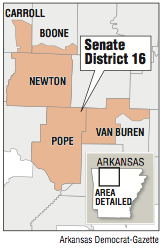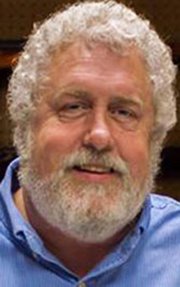Russellville Republicans are dueling in Tuesday’s special runoff election for a vacant state Senate seat, with Republican Gov. Asa Hutchinson and his GOP challenger Jan Morgan backing different candidates.
Breanne Davis, 35, is a senior account executive with North Carolina-based global analytics firm SAS Institute. Davis serves on the Russell-ville School Board.
Robert J. Bailey, 59, owns Bailey Signature Firearms and is a retired machinist from the Entergy Arkansas Nuclear One plant.
They are vying for the GOP nomination in Senate District 16.
They disagree over several issues: Arkansas’ version of Medicaid expansion, a proposed constitutional amendment that would limit certain damage awards in lawsuits, and a 2017 law that allows people with enhanced training to carry their concealed handguns on public college campuses and other public places.
The Senate District 16 seat became vacant with the Nov. 16 death of Sen. Greg Standridge, R-Russellville, from cancer. The Senate district is made up of Newton and Pope counties and parts of Boone, Carroll and Van Buren counties.
Davis and Bailey advanced to Tuesday’s runoff by winning more votes than the other candidate, Luke Heffley of Russellville, in the Feb. 13 primary election. Davis tallied 2,440 votes, while Bailey posted 2,327 votes and Heffley won 854 votes, according to the secretary of state’s website.
The special runoff election “is very contested [and] I have also had a number of people in my classes ask about it, that RARELY happens in any election outside of president,” Brendan Toner, an assistant professor of political science at Arkansas Tech University, said in an email. “I know of a number of Democrats who have gotten involved even though it is a Republican primary … because they see Davis as a more moderate candidate than Bailey.”
In early voting in Pope County alone, 2,782 early votes were cast Tuesday-Friday, according to the county clerk’s office. Early voting resumes Monday during regular business hours in the counties in the Senate district, according to the secretary of state’s office.
The Republican nominee will take on Russellville Democrat Teresa Gallegos in a special election May 22 — the same day as the regular primary election. The victor of the special election will serve in the Senate until January 2021, the rest of the four-year term to which Standridge was elected in 2016.
Hutchinson, who has been governor since 2015, endorsed Davis in the runoff because “the governor has known Breanne Davis for over 10 years [and] her views and values are conservative and she has the heart of a public servant,” said Jon Gilmore, Hutchinson’s chief political strategist. The governor hosted a fund-raiser for Davis on Feb. 28 in Russellville, Gilmore said.
Morgan, who owns a gun range in Hot Springs, supports Bailey because “he’s a true conservative” and “he believes in reducing the size of gov’t by decreasing spending and eliminating waste and abuse of taxpayers money,” Morgan spokesman Tracy Horne said in an email.
In her latest campaign finance report, Davis reported raising $148,325 and spending $94,068.38, leaving $54,256.62 in her campaign account as of March 3. She also reported $4,200 in nonmonetary contributions. Hutchinson’s political action committee, called ASA PAC, has contributed a total of $5,400 to her campaign — the maximum contribution of $2,700 apiece for the primary and runoff elections.
In his latest campaign finance report, Bailey reported raising $42,025 in contributions and spending $40,662.77, leaving $1,362.23 in his campaign account as of March 3. He also reported $20,717.19 in nonmonetary contributions.
Davis’ financial supporters include business and health care interests, while Bailey’s financial backers include opponents of the Medicaid expansion.
ARKANSAS TECH
Heffley, who won more votes in Newton County than either Bailey or Davis, said he endorsed Davis in the runoff because “I think she would represent everybody in the district,” including the interests of Arkansas Tech University in Russellville. Heffley is a special projects coordinator at Arkansas Tech.
Davis said, “I will fight for Arkansas Tech University and ensure they have the critical funding they need.”
Before the Feb. 13 primary, Bailey told the Arkansas Democrat-Gazette that he didn’t know whether Arkansas Tech gets too much state money or an inadequate amount of state funds. “Who are you supposed to believe? There’s not information for me to make an informed decision.”
Bailey said last week that he favors increased state funding for Arkansas Tech.
“Arkansas Tech is such a valuable asset to our Senate District and the whole state that deserves to be supported financially just like UA-Fayetteville or Arkansas State,” he said in a written statement.
“What we have gotten so far doesn’t seem to be working to get more funding for Arkansas Tech so we should send someone new (Bob Bailey) to the state Senate, not someone who is part of the establishment (my opponent) that will support the status quo.”
ARKANSAS WORKS
Bailey said Arkansas’ version of Medicaid expansion — called Arkansas Works — which provides private health insurance coverage to some low-income Arkansans, is financially unsustainable because “it simply costs too much money and has no dedicated funding stream.”
“Because of this, the state must constantly seek to raise taxes,” he said in his written statement. “We simply cannot afford it now at the 6% level and in two years we will owe 10% of the total costs.”
Bailey said, “We should freeze enrollment like the Republican House of Representatives passed [legislation to do] in the 2017 legislative session through [House Bill] 1465. This does not toss people off the program, but keeps new people from signing up.”
That bill failed to clear a Senate committee after officials from the state Department of Human Services testified that rather than saving money, the bill likely would increase the cost of the program to the state budget by as much as $43.5 million a year.
Arkansas Works now covers about 285,000 low-income Arkansans. The state’s share of the program’s total costs is 6 percent this year, 7 percent next year and 10 percent in 2020 under current federal law.
The Department of Human Services projects the state’s costs for the program at $135 million and the federal government’s cost at $1.95 billion in fiscal 2019, which starts July 1.
Hutchinson has asked the federal government for permission to reduce the income eligibility threshold for the program from 138 percent to 100 percent of the poverty level, which is projected to to reduce the program’s enrollees by about 60,000 and reduce the cost.
Davis said Arkansas paid no cost for the Medicaid expansion authorized in 2013 during its first few years of existence.
“As the state’s share of the expense grows, I will work with the governor, leading state and federal offices, and Arkansas healthcare providers to determine if the program is working,” she said. “Voters should be cautious of politicians with [a] simple answer to this complex problem.”
LAWSUIT DAMAGES
Bailey said he opposes a proposed constitutional amendment that would limit damages in certain lawsuits and limit attorneys’ contingency fees because “it puts a price tag on human life.
“Also, this amendment allows the legislative branch to encroach on the judicial authority’s rulemaking authority,” he said.
The proposed constitutional amendment, which was offered by the Legislature, will appear on the Nov. 6 general election ballot.
Davis said she supports the proposal because “it will protect Arkansans from being hit with unreasonable contingency fees charged by attorneys, but still allow them to recover every dime they lose as a result of someone’s negligence, whether that be medical bills or lost wages, both past and future.”
“There are absolutely no caps on those damages,” she said. “If the defendant acts intentionally, there will be no cap on the amount of punitive damages.”
GUNS ON CAMPUS
Bailey said he doesn’t support legislation enacted in 2017 that allows people who have concealed carry permits for handguns to carry their weapons on Arkansas public college campuses if they get an extra eight hours of training.
“Why is it that one can carry in most places such as a crowded church or a movie theatre without specific training, but you must have an enhanced carry license to carry a gun at a public college?” he said in a written statement.
Bailey said he supports allowing anyone who can legally carry a handgun to carry the weapon on public college campuses.
“We should not add new regulations or treat people unequally,” he said. He contended that Arkansas is a constitutional carry state with no permit required for a person to carry a handgun either concealed or openly, and all laws that are conflicting should be repealed.
Davis said she supports the 2017 law on enhanced training.
“Law-abiding citizens should have the ability to protect themselves on college campuses and the Legislature worked to ensure this was possible,” she said.
Davis said she doesn’t support restricting law-abiding gun owners in any way.


